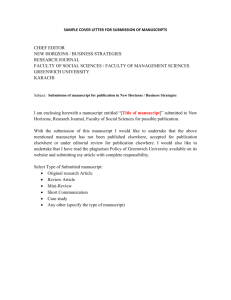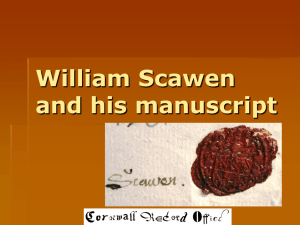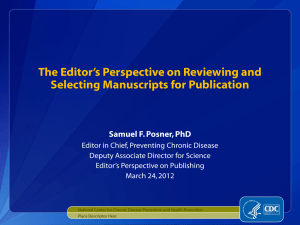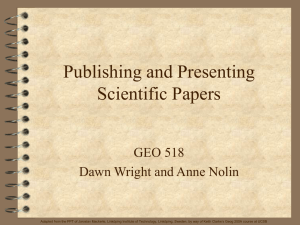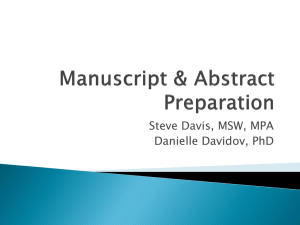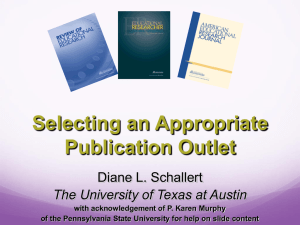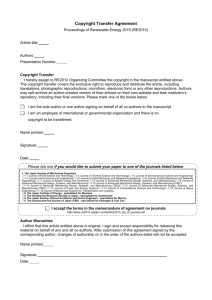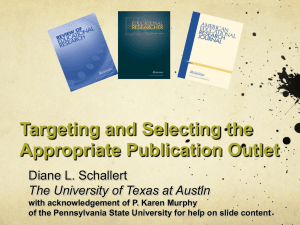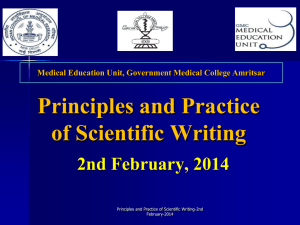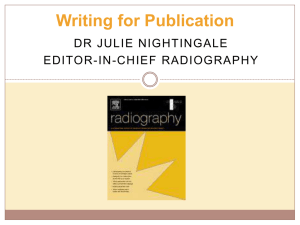How to submit your manuscript?
advertisement
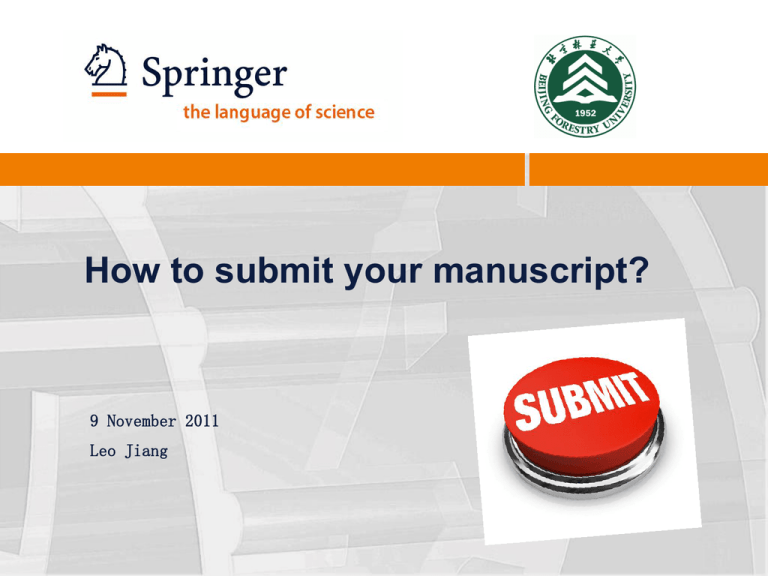
How to submit your manuscript? 9 November 2011 Leo Jiang 2 Cycle of Academic Research 3 Researcher reads journals & books Article or books published Comes up with a research project Publishing is an indispensable part of Scientific Research Passes peer review Writes article or books Gets funding Does research Introduction 4 Publishing in English allows you to reach the broadest possible audience English is the international language of science Before you begin 5 Journal editors want to publish good quality science that is of interest to their readers • Describes research that advances the field • Is carefully prepared and formatted • Uses clear and concise language • Follows ethical standards Before you begin 6 Good readers make good writers! Writing Before you begin 7 Research topics can be identified by exploiting opportunities Read review literature including related fields Seek out those unexplained findings, controversies, emerging fields Talk with experts, attend conferences Before you begin 8 Reading Resources from Springer Database E-newsletter Table of Content http://weibo.com/springerchina Choosing a journal 9 Authors need to choose journals according to certain criteria Factors considered are: Appropriateness of themes Aims and scope Target audience Publishing frequency Open-access or subscriber-based Impact Factor Cost Publication type Choosing a journal 10 Choosing a journal • Talk to colleagues • Read the journals product page and READ THE JOURNAL • Read the aims and scope of the journal, does your paper fit the aims and scope of the journal • Read and follow the instructions for authors • What are your priorities – e.g. speed of publication, impact factor, reach? Choosing a journal Journal Selector by 理文编辑 www.liwenbianji.cn/journal_selector 11 Choosing a journal 12 Preparing your manuscript 13 Derntl, M. (1999) Basics of Research Paper Writing and Publishing. Unpublished manuscript— Revision 2.1—September 2009, Faculty of Computer Science, University of Vienna, Austria. Preparing your manuscript 14 By linking, scientific writing evolves in the same way as telling a story Expanded IMRaD Title Abstract Introduction Methods Results Discussion Conclusions Acknowledgements References Appendices Fulfills reader expectations Preparing your manuscript 15 The order of writing your manuscript in the IMRaD format starts with the easiest The easiest to write is … Methods and Results write during the research Discussion and Introduction write after selecting target journal Title and Abstract write last Preparing your manuscript 16 Preparing your manuscript 17 Cover letters ---A good cover letter will help “sell” your manuscript to the journal editor. Common phrases: • Please find enclosed our manuscript, “[manuscript title]” by [first author's name] et al., which we would like to submit for publication as a [publication type] in [name of the journal]. • To our knowledge, this is the first report showing… • We believe our findings would appeal to the readership of [journal name]. • Please address all correspondence to: • We look forward to hearing from you at your earliest convenience. All cover letters should contain these sentences: • We confirm that this manuscript has not been published elsewhere and is not under consideration by another journal. • All authors have approved the manuscript and agree with its submission to [insert the name of the target journal]. Submitting 18 Electronic submission • Electronic submission substantially reduces the editorial processing and reviewing times and shortens overall publication times Submitting 19 Please register firstly Submitting 20 Please click here to start your submission Submitting Successful 21 Peer review 22 Journal publishing timelines can vary depending on editor and reviewer Submission to publication 3 months – 12 months Manuscript submitted Editor assigns reviewers Editor elects rapid rejection OR peer review Revise manuscript Reviewers evaluate accept, revise OR reject Article Publication! Peer review 23 Peer review 24 Article Tracking – track the status of your article during production Publication ethics DO NOT… AND I REPEAT, … DO NOT •Data fabrication and falsification •Plagiarism •Multiple submissions •Redundant publications •Improper author contribution or attribution 25 26 Summary Submit • • • • Identify appropriate journal Well prepared manuscript and introductory letter Recommend appropriate reviewers Keep in touch with editors Re-submit • • • Response to reviewer’s comments point by point Highlight corrections in your revision Submit your rebuttal of reviewers’ comments to editor (If necessary) 27 Springer Author Academy (http://www.springer.com/authors/journal+authors/training) How to submit your book manuscript http://www.springer.com Subject area 29 http://www.springer.com/chemistry 30 If you want to publish your book, please contact the editor How to submit your manuscript to Springer Contact our editors in China 31 32 Process of Book Publication Outline/AEQ/(Sample, Author CV, Recommendations) MS Check Proof Check Sample Check Publication Review Writing http://www.springer.com/authors/book+authors Book authors can access detailed guidelines from Springer.com 33 34 Relevant books on SpringerLink • From Research to Manuscript • • • • A Guide to Scientific Writing Katz, Michael Jay ISBN 978-1-4020-9466-8 http://www.springerlink.com/content/978-1-4020-9467-5 • English for Writing Research Papers • • • Wallwork, Adrian ISBN 978-1-4419-7921-6 http://www.springerlink.com/content/978-1-4419-7922-3 Helping to build Bridges to the World Need to为中国科学家搭建通向世界的桥梁 report your results, but don’t have the time to write a book? A new publication model: SpringerBriefs 35 Publish with SpringerBriefs. • Concise summaries of cutting-edge research and practical applications comprising 50 to 125 pages. • Included as part of Springer’s eBook collection, with access to millions of users worldwide. • Briefs are available for individual print and electronic purchase as well as MyCopy editions for library patrons with access to eBooks. THANK YOU 谢谢! springer.com/briefs
